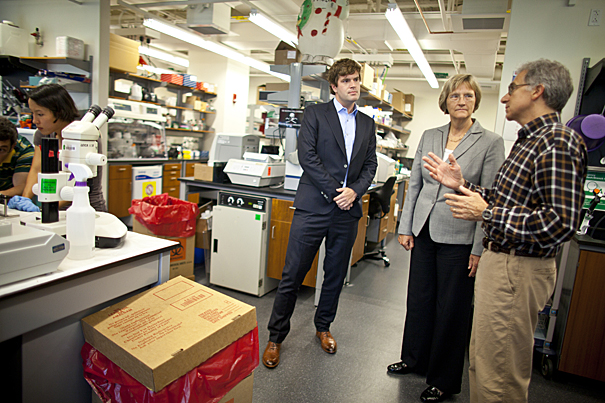
Harvard University President Drew Faust (center) visits with Doug Melton (right), co-director of the Harvard Stem Cell Institute, and Kevin Eggan (left), associate professor of stem cell and regenerative biology.
Justin Ide/Harvard Staff Photographer
Importance of stem cell research
President Faust issues statement in support of Harvard’s vital work
A temporary restraining order that blocked federal funding for certain kinds of stem cell research was viewed by many as a blow to cutting-edge science that already is yielding clues to cures for a number of fatal illnesses and chronic diseases. Harvard has been in the vanguard of such research, and the University, as a member of the Coalition for the Advancement of Medical Research, supported an amicus brief filed last Friday (Sept. 3), urging the court to lift the restraining order imposed in Sherley v. Sebelius. The day before that brief was filed, Harvard President Drew Faust visited one of the University’s stem cell labs, and today (Sept. 7) she issued the following:
In a recent visit to the laboratory of Doug Melton, co-director of the Harvard Stem Cell Institute, I was reminded of the remarkable ingenuity and commitment by this extraordinary team of scientists, and their dedication to improving lives. Stem cell research has emerged as one of the most important new areas of human biology. Although the effort is still young, it promises to help us treat and someday even find cures for diseases such as diabetes, ALS, Parkinson’s, and leukemia.
This vital work is now in jeopardy because of a recent court injunction halting the use of federal funds to pursue embryonic stem cell research. We hope that the temporary injunction will soon be lifted and that Congress will take the steps necessary to ensure that stem cell scientists can carry on their work vigorously and responsibly, in the interests of the millions of people who may someday enjoy its benefits.
Harvard strongly supports its stem cell researchers, and we are deeply grateful for the generosity of the many private donors who will remain critical to sustaining our efforts. But without the flow of essential federal funds, the promise of stem cell science is at risk of becoming a dream deferred — and, for some, a dream undone.





